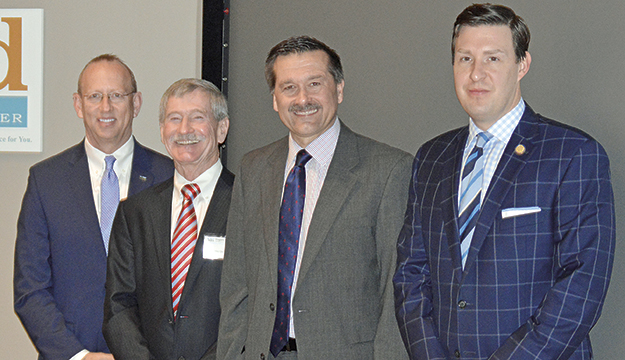Photo above: Virginia Highlands Community College President Dr. Gene Couch, (left) hosted the summit, which included a panel discussion featuring Mike Quillen and Delegates Terry Kilgore and Israel O’Quinn. Photos by Scott Robertson
By Scott Robertson

Chris Lloyd promoted GOVirginia’s potential benefits to rural workforce development efforts.
Mike Quillen, the former chairman of Alpha Natural Resources, flashed a PowerPoint slide from a George Mason University economic development study on the screen at the Southwest Virginia Economic Development Summit March 1 and asked the audience, “What’s the first thing you notice?” The slide showed economic data for Northern Virginia, Hampton Roads, Richmond, Roanoke, Lynchburg, Harrisonburg, Charlottesville, Winchester, Blacksburg and Staunton. “We’re not even listed,” came the reply from several in the crowd.
“We’re not there,” Quillen confirmed. “Southwest Virginia isn’t even listed.”
That “Virginia stops at Roanoke” mentality is something Quillen and his fellow GOVirginia proponents hope will change with the coming of the new economic development realities in the Commonwealth, both through sweeping changes in the Virginia Economic Development Partnership and through GOVirginia.
Delegate Terry Kilgore, a GOVirginia board member said that for too long, Richmond has penalized Southwest Virginia because the region has Virginia Coalfield Economic Development funds and Tobacco Settlement money that’s not available to other regions. “We hope this will help address that,” Kilgore said.
GOVirginia (the GO stands for Growth and Opportunity) is a public-private partnership with state funding and a majority of its leadership coming from the private sector. Quillen and K-VA-T Food Stores CEO Steve Smith are heading up the effort in Southwest Virginia. The main goal of GOVirginia is to broaden and diversify the Virginia economy through development of new high-paying jobs in areas where the commonwealth is not currently a leader.
The need for that diversification became apparent under the Obama administration, when defense spending was being cut under the sequester-based austerity plan. The so-called Golden Crescent that has driven Virginia’s economic growth was shown to be too dependent on defense industry dollars. Now that President Trump is budgeting new defense spending, it’s important that the Commonwealth not be lulled into a false sense of economic security, said Dr. Bill Murray, corporate public relations director for Dominion Power. “The danger for Virginia is that if you get a one-administration increase in defense spending, you might slip back into the mindset of, ‘We didn’t really need to worry about that diversification stuff. Happy days are here again.’” Similarly, Southwest Virginia needs to diversify its economic base, not because of overdependence on defense spending, but because of overdependence on coal. “The temptation now will be to be overconfident, rest on our laurels and under-invest.”
Chris Lloyd, senior vice president and director for McGuire Woods Consulting, a site selection firm in Richmond, told the summit attendees Southwest Virginia’s best bet to succeed is to focus on the workforce. That’s why the summit was held at the Southwest Virginia Higher Education Center and hosted by Southwest Virginia Community College. “The beauty of the community college system,” Lloyd said, “is that it is a workforce training system that works in Virginia at all levels to meet specific industry needs. I always said, ‘there’s not a cosmetology gap.’ A lot of schools used to just push through students with no connection with what industry was saying it needed.”
At one point, 67 Virginia high schools had medical CTE training, while more than 200 had programs for fashion design. “The last time Virginia was a fashion leader was the 1760s,” Lloyd said. “We have been training people for jobs that didn’t exist. GOVirginia can work with the community college system and a reinvigorated economic development effort to really focus on what industry says it needs now, and five years from now, and 15 years from now.”
In many cases in Southwest Virginia, with former miners making up a large percentage of the available workforce, Quillen said, it’s not even about the training. It’s about providing the certification to confirm the workforce has the skills that are already present. “Miners have these skills, whether it be welding or whatever,” Quillen said, “but they need the certifications that companies are looking for. We can get companies to come here when they get in the door. But we need to show those certifications to get them in the door.”
Kilgore pointed out that the community college system is capable of taking the certification courses to the miners. “They can do that on demand,” he said, noting that if a community 30 miles from a college has a public library or other meeting place, the college can provide off-campus education.
The next meeting of the regional GOVirginia board is March 14. The boards have had to wait to see what grant funding the state will be providing in this and next year’s budgets ($20 million, down from a proposed $36 million) before beginning their work.




